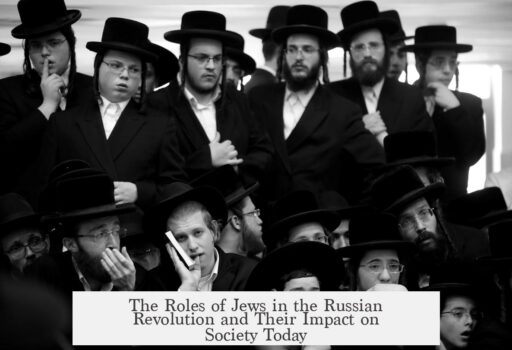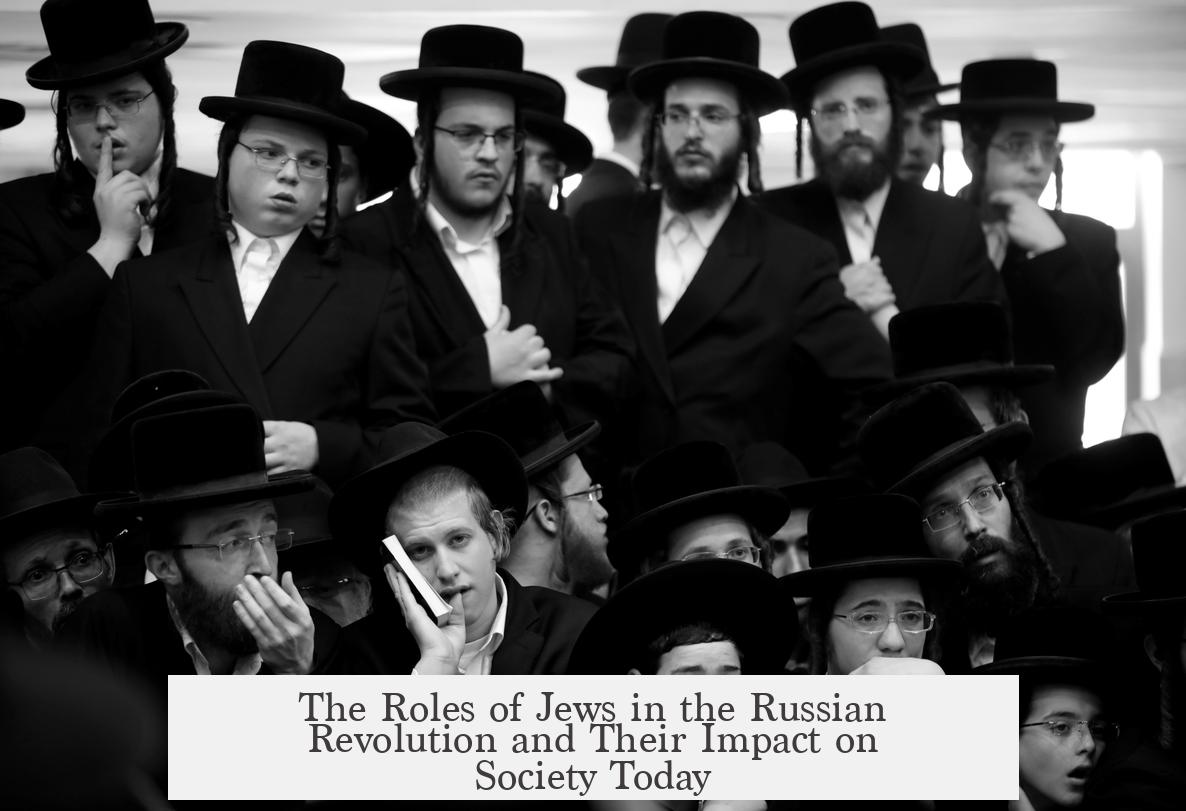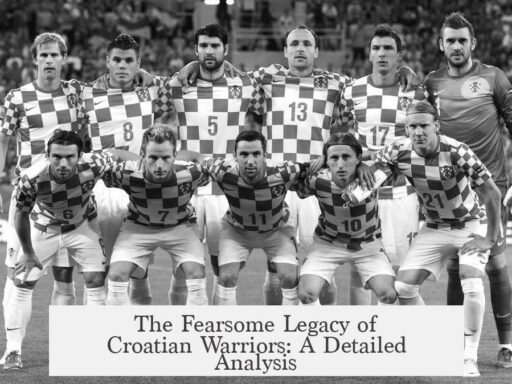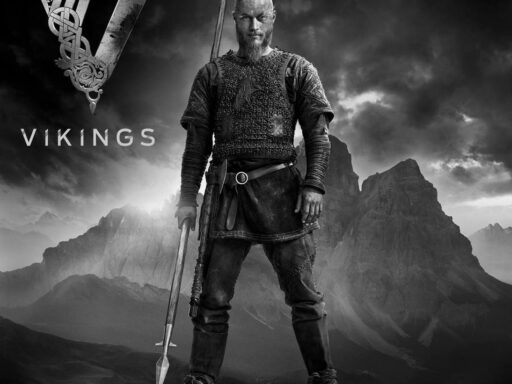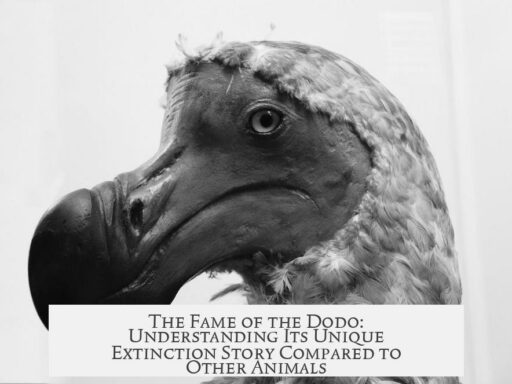Jews played varied and significant roles in the Russian Revolution, influenced by their social status, political affiliations, and experiences with antisemitism within Tsarist Russia’s complex environment.
Following the emancipation of the serfs, Jews in Tsarist Russia found themselves at the bottom of the social order. The Tsarist regime imposed strict restrictions on Jewish life. They were confined to living within specific western oblasts, known as the Pale of Settlement, and their movement was tightly controlled. Although some Jews managed to rise economically and evade these limitations, the vast majority lived under severe social and legal constraints. This oppressive context explains the strong Jewish involvement in revolutionary politics, as many sought to overturn the system that marginalized them.
Antisemitism deeply permeated the political landscape, especially on the right. Conservatives blamed Jews for attacks on traditional values such as hierarchy, order, and social stability. This scapegoating was a persistent feature of right-wing politics before, during, and after the Revolution, contributing to heightened tensions between Jewish communities and nationalist forces.
Within revolutionary movements, Jews contributed to various factions, with notable influence in socialist and Marxist parties. The Bolshevik faction included a significant number of Jewish members, with Leon Trotsky as the most prominent Jewish Bolshevik leader. Trotsky came from a successful Jewish family that had overcome many of the prevalent social restrictions. However, the Bolsheviks ranked only third in Jewish membership compared to other revolutionary groups.
The Mensheviks, another faction of the Russian Social Democratic Labour Party, had a larger Jewish representation than the Bolsheviks. The Bund, also known as the General Jewish Workers Association, was almost entirely Jewish and fought specifically for Jewish workers’ rights within the Russian Empire. Jewish participation was widespread across political lines, including the Zionist parties and conservative groups like Agudas Yisroel in Poland.
Jewish revolutionaries often prioritized their Marxist ideology above their Jewish identity. Many saw themselves primarily as internationalists rather than members of a distinct religious or ethnic group. Trotsky, for example, famously identified foremost as an internationalist. This perspective shaped their political strategies and alliances, which did not necessarily align with Jewish communal solidarity.
Political rivalries within Jewish factions also reflected competing ideologies more than ethnic unity. Trotsky famously opposed fellow Jewish leaders like Grigori Zinoviev and Lev Kamenev in the early post-Lenin power struggles. This opposition demonstrates that political loyalty superseded ethnic ties even among Jewish revolutionaries.
To understand these dynamics in more depth, Paul Hanebrink’s book A Specter Haunting Europe: The Myth of Judeo-Bolshevism offers a comprehensive examination. It unpacks the complex role Jews played in revolutionary politics and how antisemitic myths, such as the accusation of Jewish control over Bolshevism, distorted historical realities.
| Aspect | Details |
|---|---|
| Social Status | Bottom of hierarchy post-serf emancipation; confined to Pale of Settlement |
| Antisemitism | Widespread in political right; Jews blamed for eroding traditional values |
| Revolutionary Parties | Jews present in Bolsheviks, Mensheviks, Bund, Zionists; Mensheviks had most Jewish members |
| Identity | Many prioritized Marxism/internationalism over Jewishness |
| Intra-Jewish Rivalries | Political divisions stronger than ethnic solidarity |
- Jews were socially marginalized in Tsarist Russia, fueling revolutionary involvement.
- Antisemitism on the political right affected perceptions and roles of Jews.
- The Bolsheviks had notable Jewish members but did not dominate in Jewish revolutionary participation.
- Jewish identity was often secondary to Marxist ideology among revolutionaries.
- Internal Jewish political rivalries reflect prioritization of ideology over ethnicity.
What Were the Roles of Jews in the Russian Revolution?
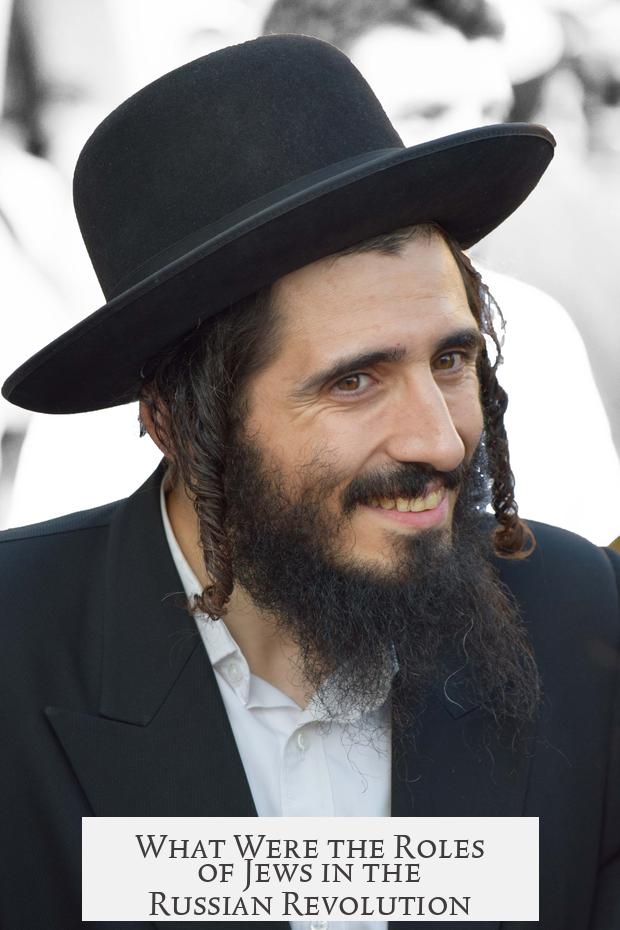
Jews played complex and varied roles in the Russian Revolution, shaped by a difficult social position, political ambitions, and diverse identities. They were not just footnotes or scapegoats but active participants in shaping revolutionary politics in early 20th century Russia. Let’s unpack this fascinating story.
Imagine living at the bottom of a rigid social ladder, with few rights, confined to certain regions, monitored closely by an oppressive regime. This was the harsh reality for most Jews in Tsarist Russia after the emancipation of the serfs. The Tsars didn’t just oppress peasants; Jewish communities bore the brunt of systemic restrictions, barred from many professions, and subjected to discrimination. Most Jews were stuck in western oblasts, their movements tightly controlled. Wealthy exceptions existed, but they were rare.
This tough situation helps explain why many Jews gravitated toward revolutionary movements. If the system is stacked against you, why wouldn’t you support radical change?
Facing Antisemitism on The Right
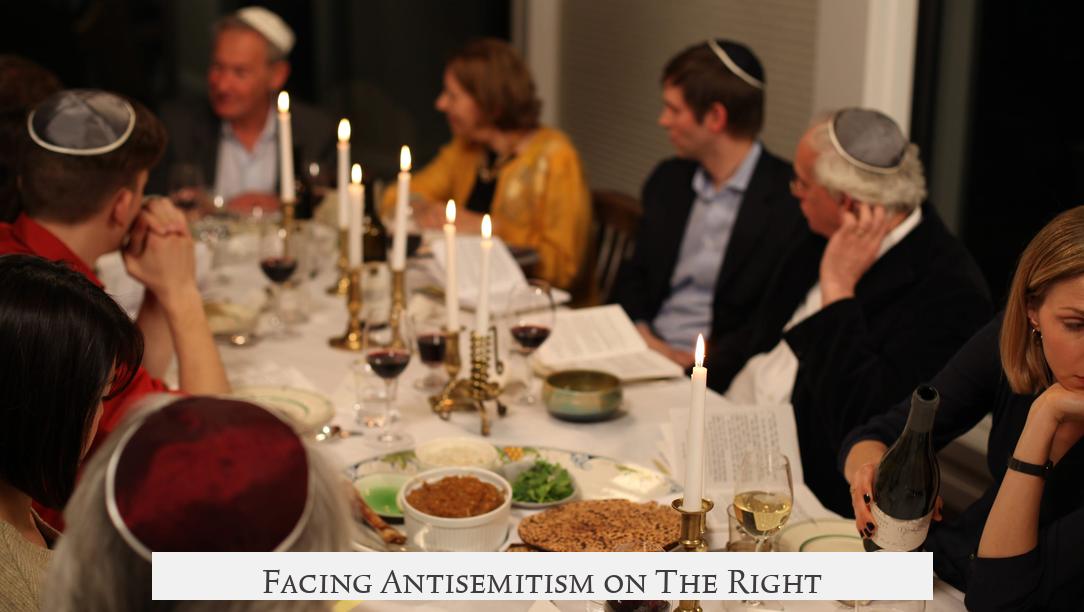
But it wasn’t just social oppression; antisemitism was baked deep into the political climate, especially among right-wing groups. For decades, the political right blamed Jews for societal shifts that threatened their cherished values: hierarchy, tradition, and order. Jews became convenient scapegoats for anything seen as destabilizing the old world. This prejudice persisted stubbornly well into the post-WWII era.
So, Jews weren’t just victims of policies but also of widespread political propaganda. How did this shape their political responses?
Jewish Participation Across the Revolutionary Spectrum
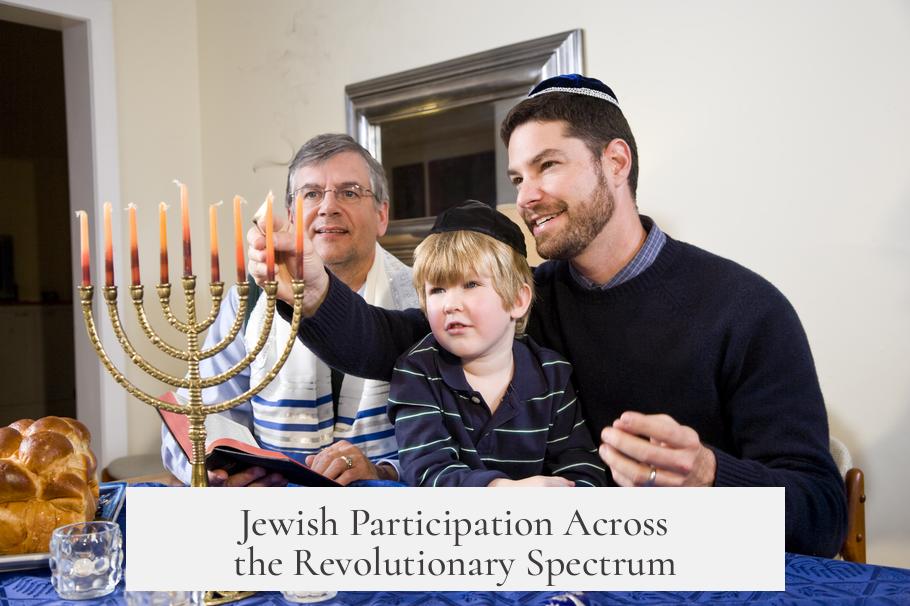
Contrary to some simplified tales, Jewish revolutionary involvement was not monolithic. Though many remember Trotsky as the iconic Jewish Bolshevik, he represented only one part of a broader mosaic. Trotsky’s family had achieved a degree of wealth that allowed them to sidestep some of the harsher restrictions, illustrating the complex class dynamics within Jewish communities.
Among revolutionary parties, Bolsheviks ranked third in terms of Jewish membership. The Mensheviks actually had more Jewish members and leaders. Meanwhile, there was the Bund, or General Jewish Workers Association, an entirely Jewish political party focused on socialist and cultural autonomy for Jews. Zionist parties, spanning various political leanings, and conservative groups like Agudas Yisroel in Poland had significant Jewish memberships too.
Interestingly, many Jewish revolutionaries saw their Marxist ideology as their primary identity, rather than their Jewishness. Trotsky famously declared himself an internationalist first, aligning with a global proletarian cause over ethnic ties. Party loyalty often trumped communal loyalty. For example, Trotsky opposed fellow Jewish party members Grigori Zinoviev and Lev Kamenev in early power struggles, showing that political ideologies often outweighed ethnic solidarity.
The Myth of Judeo-Bolshevism
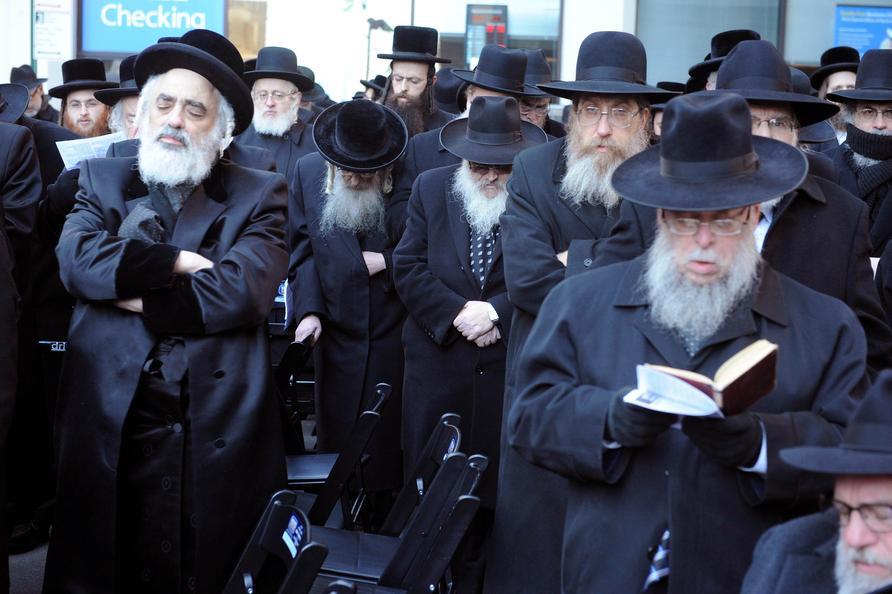
The role of Jews in the revolution has been misunderstood and exploited historically. You’ve probably heard about the “Judeo-Bolshevik” myth—a conspiracy claim that Jews orchestrated the revolution to dominate Russia. This sensationalist theory ignores the real nuance and diversity of Jewish political involvement. For those interested in a thorough breakdown that debunks this myth while explaining the genuine roles Jewish individuals played, Paul Hanebrink’s A Specter Haunting Europe: The Myth of Judeo-Bolshevism is an excellent resource.
Why Does This Matter Today?
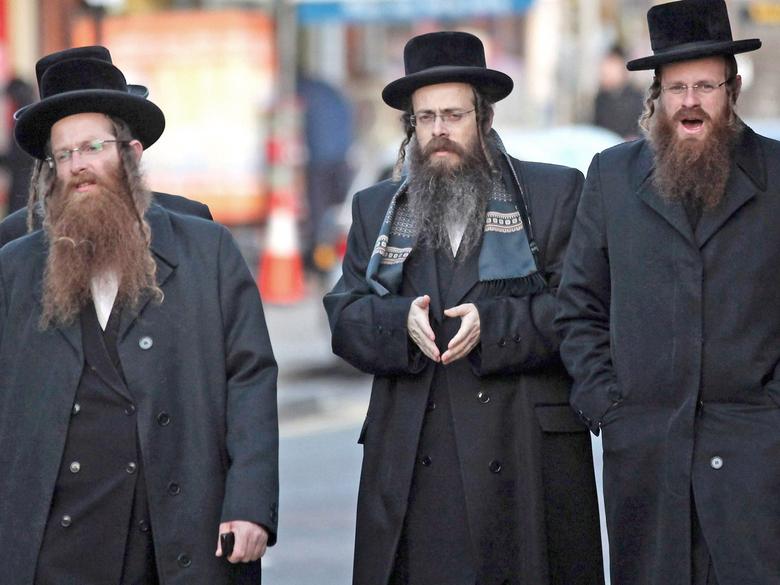
Understanding Jews’ involvement in the Russian Revolution is more than a history lesson—it challenges stereotypes and offers insight into how minority groups respond to oppression. It illustrates that people’s political choices are often shaped by their social conditions and that identities are multifaceted, not one-dimensional.
Would you have expected that the Jewish revolutionary story was so varied? The diversity among parties and personal identities contradicts simple tales of group loyalty or uniform ideology.
Here Are a Few Takeaways:
- Jews in Tsarist Russia faced severe social and legal restrictions that pushed many toward revolutionary ideas.
- Antisemitism on the right framed Jews as enemies of tradition, fueling political tensions.
- Jewish revolutionaries were active across multiple parties—Bolsheviks, Mensheviks, Bund, Zionists—and their affiliations often transcended ethnic identity.
- Intra-party rivalries sometimes pitted Jewish members against each other, underscoring ideological over ethnic priorities.
- The “Judeo-Bolshevik” conspiracy myth distorts this complex history and deserves critical examination.
So next time you stumble across discussions about Jews and the Russian Revolution, remember: this isn’t a story of a single group playing a simple role. It’s a tapestry woven from oppression, ideology, social class, and individual choices. The truth is far more interesting than the myths.
Want to dive deeper? Check out Paul Hanebrink’s work. You might discover that history often laughs at our attempts to simplify it.
What was the social status of Jews in Tsarist Russia before the revolution?
Jews were at the bottom of the social hierarchy. They had fewer rights and were restricted to living in certain western regions. Most could not escape these limits despite some exceptions.
How did antisemitism affect Jewish involvement in the revolution?
The political right blamed Jews for eroding traditional values like hierarchy and order. This hostility made Jewish participation in revolutionary movements more understandable.
Did Jews play a major role in the Bolshevik Party?
Jews formed a notable part of the Bolsheviks, with Leon Trotsky as the most famous example. However, Bolsheviks had fewer Jewish members than Mensheviks and the Jewish Bund.
Were Jewish revolutionaries mainly focused on their Jewish identity?
Many Jewish Marxists prioritized their ideology over their Jewish identity. Trotsky, for example, identified primarily as an internationalist rather than emphasizing his Jewish background.
Did Jewish revolutionaries always support each other politically?
No. Internal rivalries existed. Trotsky opposed other Jewish leaders like Zinoviev and Kamenev despite shared ethnicity, showing loyalty was often political rather than ethnic.
